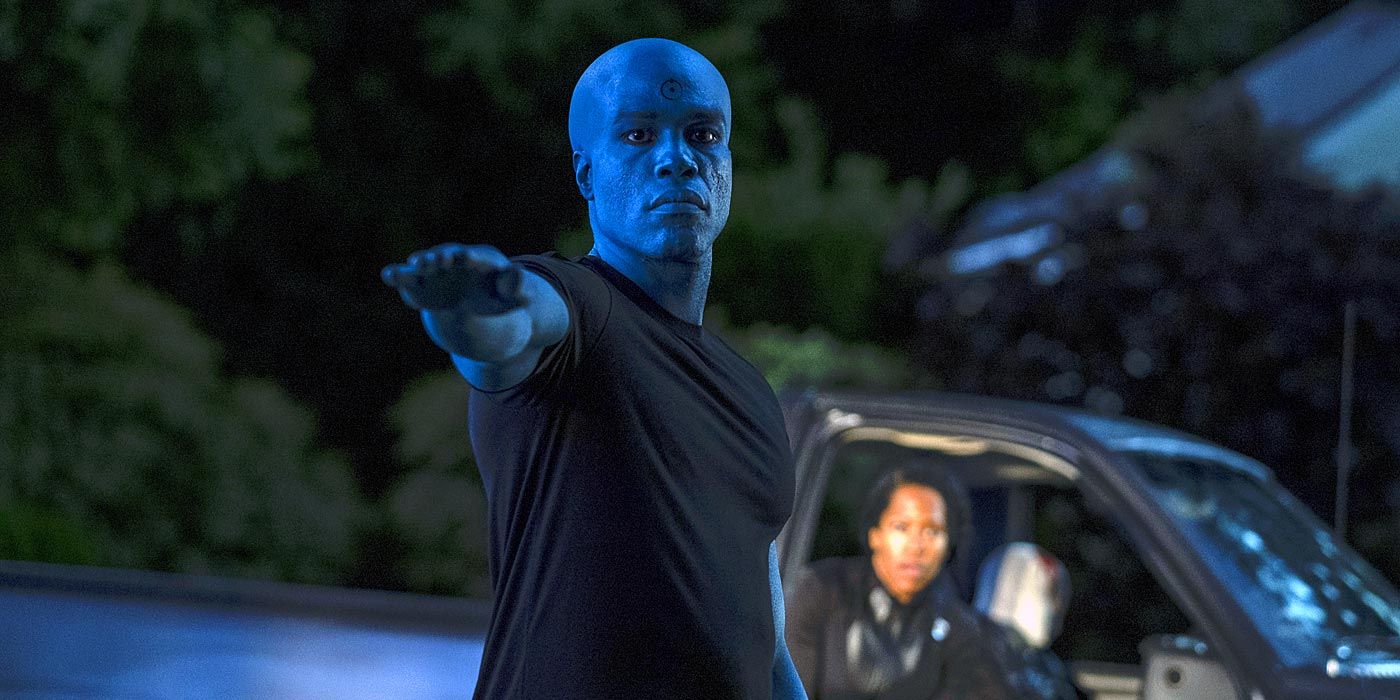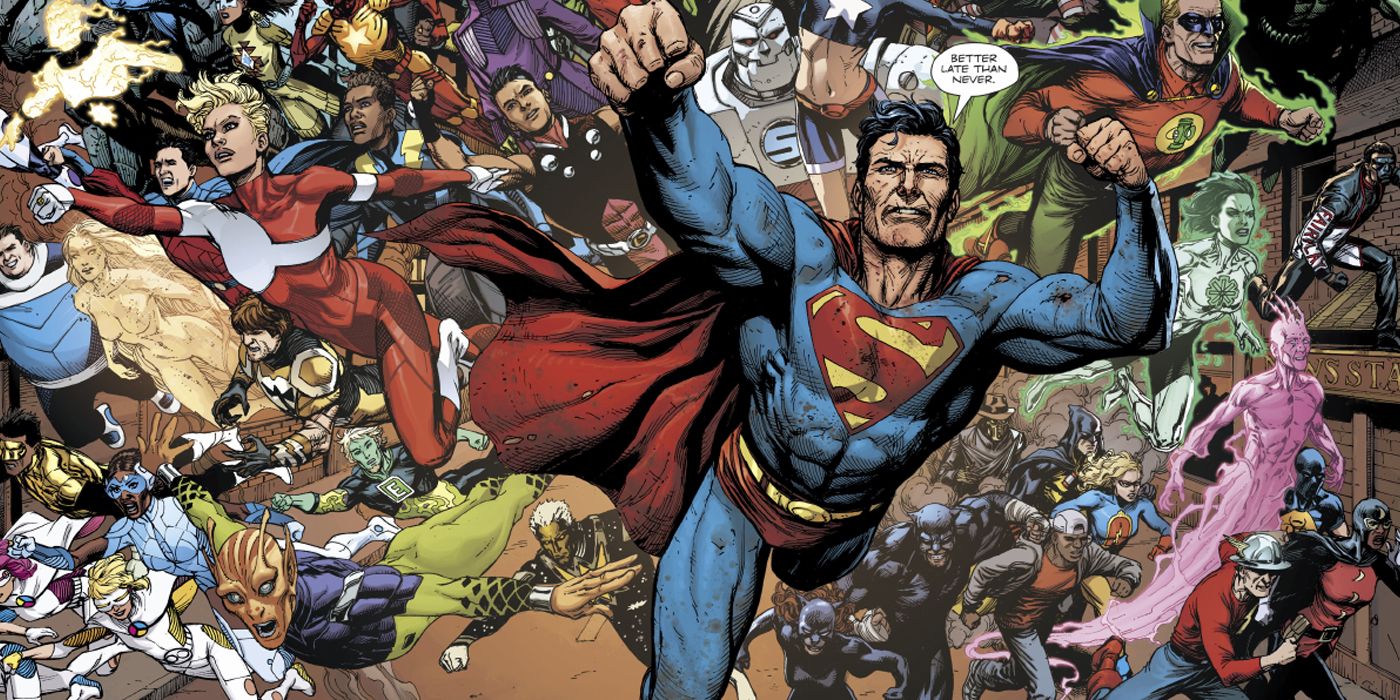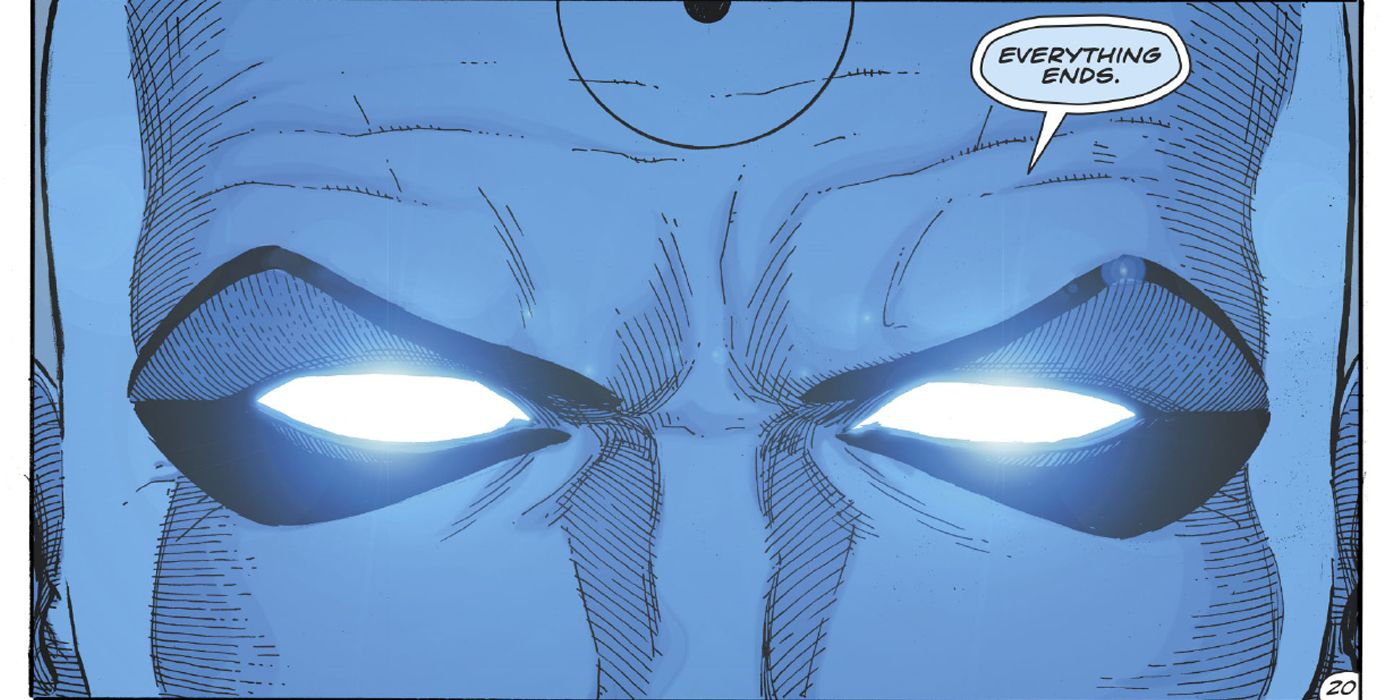WARNING: The following article contains major spoilers for Doomsday Clock #12 by Geoff Johns and Gary Frank, and Watchmen Season 1 on HBO.
Within a week of each other, the first season of HBO's Watchmen and the comic book crossover between Watchmen and the DC Universe, Doomsday Clock, have come to an epic conclusion. The comic book and television series each serves a continuation of the seminal miniseries by Alan Moore and Dave Gibbons, focusing on the legacy of its omnipotent Doctor Manhattan. Interestingly, both endings depict Manhattan's vast powers transferred to a new host, but with very different implications.
The HBO series dealt with legacy and the fallout of the original story, approached from the perspective of a new generation of masked vigilantes. That culminated in the eccentric trillionaire Lady Trieu, revealed in the finale to be Adrian Veidt's daughter, attempting to destroy Manhattan and take his powers for herself. Ozymandias finally obtained a redemption of sorts, foiling Trieu's plan -- not in time to save Manhattan, however -- before Laurie Blake arrests for his confessed murder of 3 million people during the events of the original comic.
Whereas the HBO drama approached the source material with themes of identity, redemption and generational legacy, Doomsday Clock featured vastly different messages, based on the more superhero-tinged premise. The story by Geoff Johns and Gary Frank was more of a meditation on the nature of superheroes and the comic book medium; if Watchmen was a postmodern deconstruction of superheroes, Doomsday Clock was one about restoring the genre's importance in an overwhelmingly cynical and volatile era. With that, the story focused on the central place of Superman in every iteration of the DC Universe, and his role inspiring superheroes for every generation, with a visiting Doctor Manhattan providing a metatextual perspective on the DCU's evolution given his unique relationship with space and time.
For the HBO series, Manhattan found his humanity again through love, this time with Angela Abar, a Tulsa police detective known as Sister Midnight. Manhattan had seen himself falling in love with Angela in their future, and approached her accordingly -- after initial hesitation, she accepts and they are eventually married. This connection was further solidified by Veidt, who induced a form of amnesia into Manhattan to help him take on his new domestic persona and forget his omnipotence. While Trieu's plot to kill him is ultimately successful, Manhattan succeeds in passing his power to Angela before his death as one final gesture of love.
Doomsday Clock has Manhattan remember the value of heroism from Superman's example, watching him save the day firsthand in a pitched battle in Washington, D.C. Manhattan had long assumed his encounter with Superman would result in a traditional superhero showdown. Instead, Superman finds the better way, even against overwhelming odds in facing different super-powered figures from around the world alone, saving Manhattan from a sneak attack before saving innocents. Inspired, Manhattan restores the Justice Society of America and Legion of Super-Heroes to the DCU before extending Superman's message of truth to others -- including Hollywood actor Carver Colman -- before returning to his own world and raising a son from Superman's example -- even going as far to name him Clark -- before passing his powers to him and changing his own history to live out a happy, domestic life as Jon Osterman. Even Rorschach, the most troubled superhero in the Watchmen Universe, finds his own inspiration and rededication to justice in Batman's example, saving a gravely wounded Ozymandias' life so he can answer for his crimes back in his own world.
The HBO series doubles down the real-world grittiness and tension from Moore and Gibbons' original comic, drawing from parallels of racial violence and police brutality to weave a dark, dystopian vision of the world more than 30 years after the events of the comic. For purists looking for a natural continuation of Moore and Gibbons' more grounded tone, the television series certainly delivers while providing a logical conclusion to the adventures of the original comic characters handing off the baton to a new generation of heroes; in the case of Manhattan, somewhat literally.
By contrast, Doomsday Clock mixing the two comic book worlds together means that it's going to naturally lean more into the fantastical possibilities of the DCU, from Watchmen's more cynical perspective. There is a jarring juxtaposition between seeing the Comedian brutally raid a gathering of supervillains in Gotham City or have the civil unrest commonly associated with the Watchmen Universe bleed into the DCU at every turn. But, for those looking for an exploration on the inspirational and aspirational nature of superheroes, especially Superman, Doomsday Clock certainly brings this to the forefront as a love letter to the DCU using the Watchmen characters as P.O.V. outsiders.
The HBO Watchmen series and Doomsday Clock each approach Alan Moore and Dave Gibbons' landmark story very differently. For those looking for a natural, grounded continuation to the original story, the television series is certainly the way to go. For those looking for a cross-pollination between DC's library of superheroes, Doomsday Clock provides its own hopeful message for the future. But each story ends on a more uplifting note than the original source material, wrapping up loose ends by finally bringing Ozymandias to justice while reminding Doctor Manhattan the values of his forgotten humanity and heroism.
Developed by Damon Lindelof, HBO's Watchmen stars Jeremy Irons, Regina King, Don Johnson, Tim Blake Nelson, Jean Smart, Louis Gossett Jr., Yahya Abdul-Mateen II, Tom Mison, James Wolk, Adelaide Clemens, Andrew Howard, Frances Fisher, Jacob Ming-Trent, Sara Vickers, Dylan Schombing, Lily Rose Smith and Adelynn Spoon.
Doomsday Clock #12 is written by Geoff Johns and illustrated by Gary Frank. It is on sale now from DC Comics.




